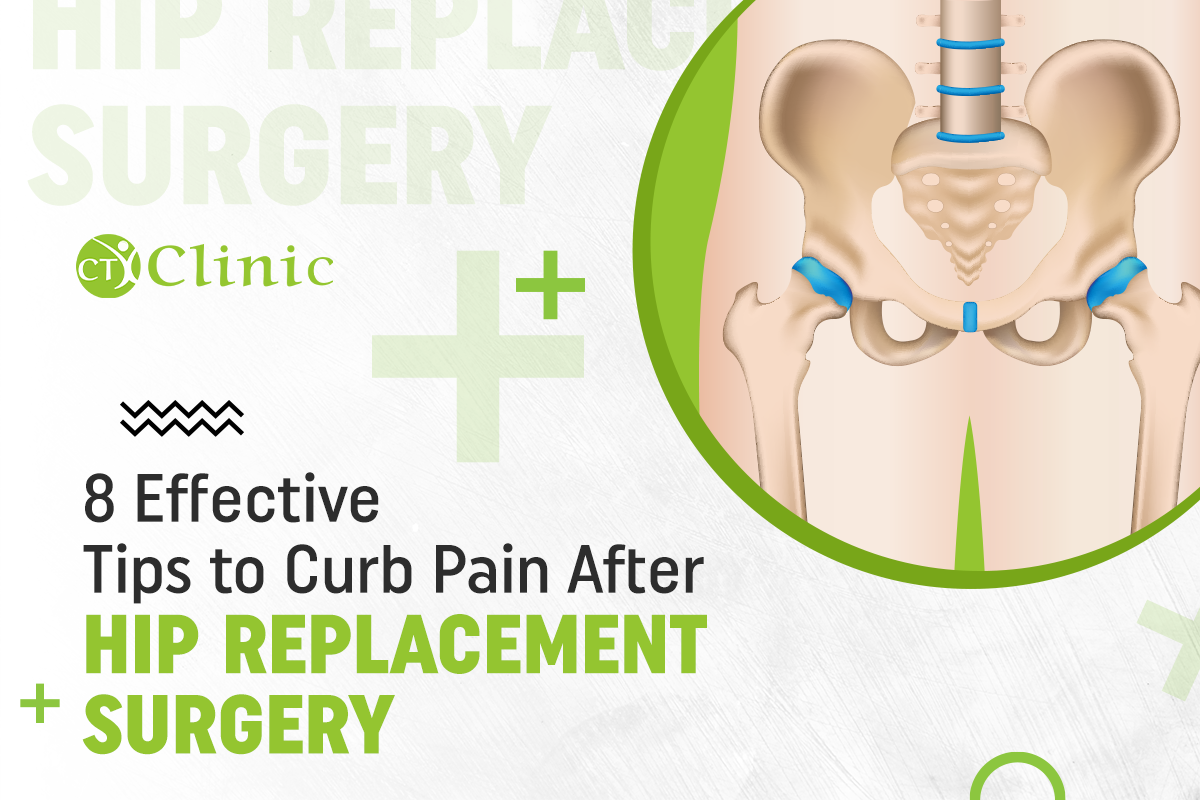
8 Effective Tips to Curb Pain After Hip Replacement Surgery
If you have undergone hip replacement surgery, you might worry about discomfort in the postoperative period. It is critical to realize that you will feel some degree of pain following surgery. Additionally, it will get worse if you engage in any physical therapy or activities.
Also, it’s possible that this pain keeps you from getting a good night’s sleep. There are several easy-to-follow methods for managing post-operative pain. These methods do not require the use of narcotics, also referred to as opioids.
In this blog, we’ve discussed effective pain management strategies following hip replacement surgery. Each of them aims to provide useful information for hip pain treatment at home and effective pain management. So, let’s proceed through this knowledgeable journey. And get a better understanding of hip pain after surgery and how to address it successfully.
Understanding Pain Following Hip Replacement.
Hip replacement surgery replaces the damaged joint with an artificial implant that functions similarly to the normal joint. As the body recovers and adapts to the new implant, certain hip replacement pain is to be anticipated.
This pain may appear at different stages of the healing process, particularly when the patient bears weight. As body’s reaction to this surgical procedure is multifaceted, including inflammation, tissue repair, and muscle adaption. Thus, hip replacement pain during weight bearing might come from strain on the surgery site and surrounding tissues.
Effective Ways to Manage Hip Pain After Replacement Surgery
1. Pain Relief Medication
Pain relievers are the most popular method to manage pain following hip replacement surgery. These medications are provided by your surgeons as part of the healing process. Hence, it is crucial to keep in mind that you should begin taking the medication immediately after surgery. If you wait for the pain to appear before taking your medications, you will have to bear the pain unnecessarily. Similarly, if you notice any negative effects from the medicine, notify your doctor right away. So you’ll know whether it’s safe to continue taking the medication.
2. Using Compression Stockings
After surgery, doctors often suggest wearing compression stockings or similar devices. They’re designed to lessen swelling in your legs and prevent blood clots. However, your doctors must prescribe and examine the compression stockings before you can wear them because they must fit you correctly. They offer a non-medical approach to easing pain and reducing swelling. Hence, they are a great option for managing pain after hip replacement surgery.
3. Ice Therapy
Ice therapy is a straightforward yet effective method for pain management. It is particularly useful within the first 48 hours after surgery. Placing an ice pack on the surgical area for 15 to 20 minutes every couple of hours can help with the swelling. This method also numbs the area, providing immediate pain relief post-operation.
4. Elevating Your Legs While Lying Down
Swelling in your legs after surgery is normal during the recovery period. Lying down and elevating your legs can assist with that. You can try it anyway by placing pillows beneath your legs or utilizing wedge pillows. Not only will it help you lessen inflammation, but when you lie down, it will also enhance blood circulation to your legs. You’ll need to rest a lot after surgery, so this strategy can help you manage inflammation and pain during the healing process.
5. Change Positions Regularly
Moving around is crucial, no matter if you’re sitting, standing, or lying down. Changing your position helps prevent stiffness and keeps you flexible. Staying in one position for too long can make your joints stiff and add to your pain. While it might be hard at first to move around when you’ve just found a comfortable spot, it’s really important for a smooth recovery. So, always remember to move.
6. Exercise and COPA Therapy Following Hip Surgery
Following hip surgery, physical exercises and COPA therapy are critical for improving hip range of motion. Your physician or a pain management specialist will advise you to follow these pain management techniques as you heal. Additionally, the goal of COPA therapy is to reduce discomfort while assisting you in gaining greater strength, flexibility, and mobility. The important thing is to stick to your therapy and exercise schedule and to quit when it starts to ache. Regaining a complete range of motion takes time, so it’s critical to recognize and respect your limitations in the interim. This promotes a steady recuperation.
7. Proper Nutrition & Hydration
Eating well and staying hydrated are super important while you recover. A good diet helps your body repair itself faster, meaning you’ll have less pain and swelling and can focus more on getting better. Drinking plenty of water is just as important, though it’s easy to forget. So, make sure you’re eating and drinking right as you heal.
8. Follow Post-Op Instructions
To manage pain after surgery, the best thing to do is listen to your doctor. If your pain doesn’t improve or you notice new symptoms, talk to your doctor about what you’ve been doing. Sometimes, certain habits or activities might be causing extra pain. Mainly, sticking to your doctor’s advice can help ensure your recovery is smooth, pain-free, and safe.
Conclusion
These are some of the greatest methods and suggestions for dealing with pain following hip replacement surgery. Make sure you follow these suggestions, as well as any others that your doctor may offer, after surgery. It will make your hip replacement healing process easier for you to complete.
If you are looking for Hip Pain Treatment in Dubai or techniques to manage it at home, visit CT Clinic. It is a well-known pain treatment center in Dubai that specializes in treating hip pain before and after replacement surgery. Reach out to us via phone at 00 971 567 950 141 or email at info@ctclinic.co.uk to arrange an appointment with one of our skilled pain specialists.

